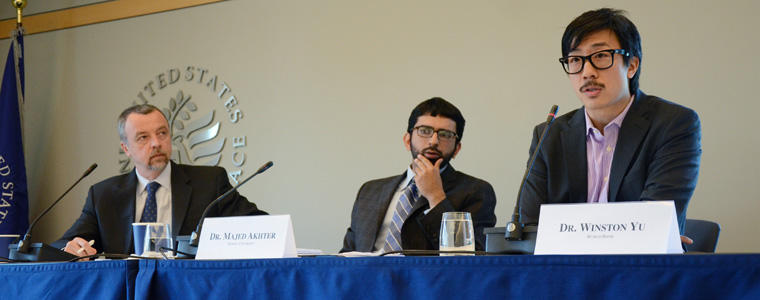Pakistan is facing growing water scarcity, as well as institutional and political obstacles to improving the availability of water in the heavily agricultural country. These water problems are exacerbating security problems and political disputes.

There are several carefully watched security concerns related to Pakistan: Islamist militancy and terrorism, the stability of next-door Afghanistan and the country’s nuclear rivalry with India. But within Pakistan, there is another, less well known source of security problems and future disputes: the country’s deteriorating water situation.
By 2030, Pakistan is expected to move from being “water stressed” to being “water scarce,” as the Food and Agricultural Organization, a United Nations entity, defines it. The authors of a recent U.S. Institute of Peace (USIP) Peaceworks study, “Understanding Pakistan’s Water-Security Nexus,” summarize the issue succinctly: “Because of overuse and misuse, the country is facing declining water availability and quality, growing water pollution, and overall environmental insecurity….Water shortages may well pose the greatest future threat to the viability of Pakistan’s economy.”
The Peaceworks report was authored by Daanish Mustafa, Majed Akhter and Natalie Nasrallah; all three provided further commentary on the issue at a May 30 meeting at USIP. They emphasize a broad sense of “security”—one that encompasses its human and socioeconomic dimensions. “Coupled with institutional, operational, and governance failures, increasing pressure over water use and misuse is fostering domestic discord. Although water is not a direct driver of conflict, it is an aggravating factor that threatens various dimensions of Pakistan’s political fragility,” they write.
Pakistan’s Sindh and Punjab provinces are at odds over dam construction on the critically important Indus River. Groundwater depletion in arid Balochistan is exacerbating tensions and hurting small farmers in a province wracked by extremist violence and Pakistani Army counterinsurgency operations. And water shortages in a poor settlement within Karachi led to protests, then violent rioting and bombings.
As one of the authors, Majed Akhter of Indiana University-Bloomington, argued, water problems in Pakistan are inextricably linked to land problems at a fundamental level. What is needed, he said, is “direct access of the poorest and most marginalized to the means of subsistence.” Pakistani land reforms—effected in 1959, 1972 and 1977—have not done as much as hoped to foster rural prosperity and dent inequality. Those efforts entailed numerous loopholes, and since a Sharia court deemed them un-Islamic they are not in effect. “We have to put land back in the mix,” Akhter said.
Daanish Mustafa, a political geographer with King’s College-London and another author of the USIP report, suggested that water reforms could serve as a “surrogate” while Pakistanis wait for genuine land reforms. On both land and water, he said, “poor people are getting the wrong end of the stick.” Though population growth and rising industrial activity are factors in growing water scarcity, Mustafa said, much of Pakistan’s water challenge resides with longstanding institutional and regulatory deficiencies.
Technical improvements to Pakistan’s water systems are helpful but not the key to the problem, agreed Winston Yu, a senior water resources specialist at the World Bank in the South Asia region. “It’s all about institutions. It’s all about management. It’s all about governance,” said Yu, who is not a report author but provided further analysis at the USIP meeting.
The third study author, Natalie Nasrallah, a research consultant on international development who previously worked with USIP on studies of conflict and natural resource management, remarked that “differing perceptions of [water] stakeholders,” as well as “deep distrust” between parties to some of the disputes, also block progress on the country’s water issues. Andrew Wilder, USIP’s director of Afghanistan and Pakistan programs, suggested that more than the technical issues, it is the “politics of distribution, allocation and access” that is central to the water challenges facing the country.
In their paper, the three authors recommend that Pakistan’s public, private and civil sectors collaborate on creating a national water policy; strengthen the provision of water services and enforcement for water use; improve transparency and data sharing on water use; and promote water conservation strategies.
“Water insecurity can make a bad situation worse,” the authors write. “Civil unrest, economic vulnerabilities, and political fragility already plague the country. Water stress should not be the security tipping point but rather a path to social harmony, environmental sustainability, and national unity.”
Their work might serve to draw more international attention to the worsening water issue in Pakistan—a country that hardly needs additional sources of internal conflict.